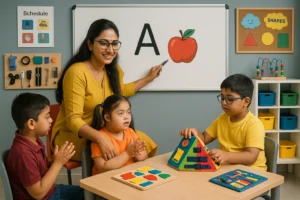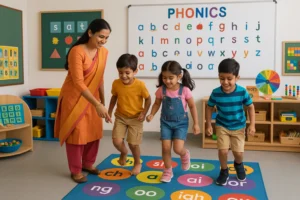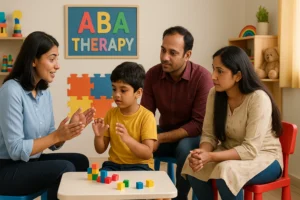
Source: frobes
Special education in autism is an adapted method of teaching that provides precisely the unique learning needs of children with autism spectrum disorder (ASD). This form of education is important because it talks about different challenges and strengths these children have, providing them with the best possible chances for learning and development.
Special education in autism gives a range of particular approaches and methods, such as:
- The TEACCH (Treatment and Education of Autistic and Related Communication-handicapped Children) program, which impacts systematic teaching based on individual wants and capacities.
- Applied Behaviour Analysis (ABA), is a therapy that uses strengthening methods to develop precise behaviors.
- Social Stories, a tool to help children understand social conditions and opportunities.
These approaches, among others, play a vital role in special education in autism, making a supportive and actual learning environment that helps each child reach their full potential.

Source: istockphoto
What is the Cause of Autism?
Autism Spectrum Disorder (ASD), known as autism, is a complex developing disorder considered by difficulties in social contact, speech, nonverbal communication, and frequent behaviors. The specific cause of autism is still an issue of current research, yet it is widely accepted that a blend of genetic, biological, and environmental factors plays an important role. Considering the cause of autism is important for developing action and support, mainly in the context of special education in autism.
Genetic Factors
Genetic Mutations
Some cases of autism are related to precise genetic mutations. Researchers have recognized several genes linked with the disorder.
Hereditary Elements
Autism often runs in families, telling a hereditary part. Siblings of a child with autism are at a higher threat of being identified with the disorder.
Environmental Factors
Prenatal Environment
Aspects such as maternal well-being, medications, and contact with toxins during pregnancy can affect the growth of autism.
Birth Complications
Complications during birth, including low birth weight and oxygen deficiency, may be related to an increased risk of autism.
Biological Factors
Age of Parents
Older parental age at the time of beginning has been related to a higher possibility of autism in children.
Neurological Differences
Individuals with autism frequently show differences in brain structure and function, showing biological foundations for the disorder.
The cause of autism is not particular but multidimensional, with each factor subsidizing in changing degrees. This difficulty presents challenges in the field of special education in autism. Educators and therapists modify their methods to meet the unique needs of each autistic individual, understanding the various factors that may have contributed to their condition.
Special education in autism emphasizes developing communication, social, and life abilities. Given the changing impacts of the cause of autism, special education programs are planned to be flexible and adaptive. For children with autism, gaining specialized education tailored to their detailed needs can make an essential difference in their development and worth of life.
To join Vidhyanidhi’s Diploma in Special Education Needs course, call on +919321024137 / +919869866277.
To download the brochure, of course, click here.

Source: istockphoto
Is Cure for Autism found?
The question, “Is a cure for autism found?” often socializes in discussions surrounding autism spectrum disorder (ASD). It’s important to know that while there is currently no cure for autism, different interventions and methods, especially in the field of special education in autism, can considerably aid in managing and lessening the challenges related to the condition.
Autism spectrum disorder is a complex developmental condition clear by challenges in social interaction, communication, and monotonous behaviour. The spectrum nature of ASD means that it distresses individuals differently, with changing degrees of cruelty.
Some of the interventions and approaches that can be applied while treating autism:
Behavioural Therapies
- Applied Behaviour Analysis (ABA)
- Speech Therapy
- Occupational Therapy
Educational Approaches
- Individualized Education Programs (IEPs)
- Inclusive Classrooms
- Special Education in Autism
Family Support and Training
- Parental Education Programs
- Sibling Support Groups
Technological Aids
- Communication Devices
- Educational Software
- Special education in autism plays a pivotal role in supporting children with ASD. Tailored education plans address specific needs, enhancing learning and development. Key aspects include:
- Individualized Learning Plans: Catering to unique strengths and challenges.
- Skill-Building: Focus on social skills, communication, and life skills.
- Special Education Professionals: Trained educators and therapists.
To join Vidhyanidhi’s Diploma in Special Education Needs course, call on +919321024137 / +919869866277.
To download the brochure, of course, click here.

Source: istock
Certificate in Autism Studies Online Courses Available
In the empire of education and development, understanding the details of various learning needs is vital. The Vidhyanidhi Education Society (Govt. regd.) institution, recognizes this necessity and offers a Certificate in Autism Studies Online Courses. These courses are meticulously designed to cater to diverse needs, as there is no singular approach to addressing disabilities.
A combination of intervention strategies often proves most effective, emphasizing the importance of specialized education in autism.
Inclusive Education: A Cornerstone for Development
The concept of inclusive education is essential in our approach. Inclusive education isn’t just about fitting children with special needs into mainstream classrooms; it’s about familiarising the environment and teaching methods to meet the various requirements of all students. This adaptation is important for nurturing an educational setting where every child, irrespective of their abilities and knowledge, can succeed.
The importance of inclusive education cannot be exaggerated. It promotes an environment of understanding and respect, teaching normally developing children to be kind towards their peers with special needs. Children with conditions like autism, ADHD, and learning disabilities (LD) profit from being part of a varied learning community, where their unique needs are recognised and spoken.
Understanding Typically Growing and Special Needs Children
A critical factor of our curriculum emphasizes on understanding the developmental courses of typically growing children and those with special needs. Knowing the differences and similarities in these growing paths is vital in creating effective teaching plans. A child with autism, for example, might have unique sensory understandings, needing a different method of learning than a typically developing child.
Fostering Various Areas of Development
Our courses focus on the holistic development of children. This includes cognitive, emotional, social, and physical growth. For children with autism, ADHD, and LD, specific attention is given to areas where they might face difficulties. Modified methods are taught to substitute development in these areas, enhancing complete growth.
Adaptive Skills and Autism, ADHD, LD
Adaptive skills are important for children to go on and become successful in their daily lives. Our courses explore the connection between adaptive skills and conditions like autism, ADHD, and LD. Considering how these conditions affect a child’s skill to adapt is vital for growing effective intervention methods.
While there is no “cure for autism found,” our focus is on getting the best out of the potential of each child. Highlighting that while no “cure for autism found” headlines may take attention, the reality is different. The development of adaptive skills can knowingly progress the quality of life for these children. It’s about preparing them with the tools to cross their world more effectively, not searching for a missing “cure for autism.”
Vidhyanidhi Education Society’s (Govt. regd.) Certificate in Autism Studies Online Courses represent an important step forward in special education in autism. By making a complete curriculum that talks about various features of development and learning, these courses encourage educators and caregivers to provide effective support to children with special needs.
Through these programs, we aim to make a more inclusive, considerate, and flexible educational setting, one where every child has the chance to reach their full potential.
“Join Vidhyanidhi’s Diploma in Special Education Needs course – transform lives and enlighten futures in autism education!”
To join VES courses, call on +919321024137 / +919869866277.
To download the brochure, of course, click here.
Special Education in Autism
FAQs
How to Become an Autism Teacher?
To become an autism teacher, get a degree in special education, complete a teacher training program, and gain related certification.
What is Autism Education?
Autism education involves modifying teaching methods and syllabuses to meet the unique learning needs of students with autism spectrum disorders.
What is The Role of The Teacher in Autism?
The role of a teacher in autism involves making adaptive learning settings, applying individualized education plans, and developing social and cognitive abilities.



